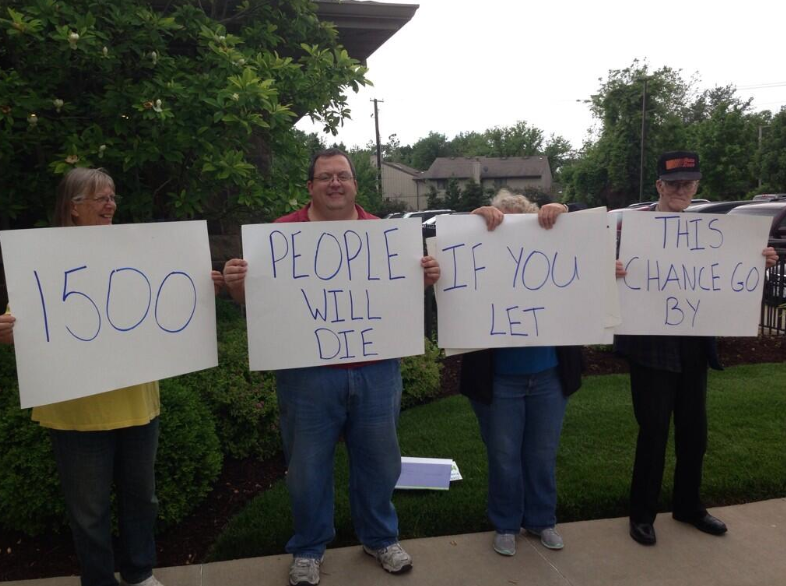COLUMBIA, Mo. — Missouri House Speaker Tim Jones told a gaggle of supporters and reporters last week in Columbia that he was forming a special commission, made up of legislators and citizens, to study Medicaid during the interim.
The announcement came after the first legislative session in which the state of Missouri debated expanding Medicaid eligibility to individuals making 138 percent of the federal poverty level, as mandated by the Affordable Care Act.

Hours before the announcement last Thursday, the move was made official as Jones spent some time in the Capitol for bill signings.
Jones, embarking on a week long “Listening Tour” throughout the state, encountered protestors from the Missouri Medicaid Coalition at multiple events, including those in Columbia, Springfield and Eureka.
Rep. Jay Barnes, R-Jefferson City, who played a key role for Republicans during the legislative session in combating Democratic efforts to expand Medicaid, will head the commission. Jones praised Barnes for his work on the issue, but leaned away from expansion.
“The problems [with Medicaid] facing our state are a lot greater than simply putting a billion dollar band-aid on a broken system,” Jones told reporters, before chiding Gov. Nixon for his lackluster support of expansion before the session began. “If Gov. Nixon ran on Medicaid expansion last year, I think a lot of us would have been more prepared to tackle the issue down the road, but he didn’t mention it last year during his campaign. He caused us all to be a little behind the eight ball.”
Jones also cited the Missouri Health Care Freedom Act, which was approved by 72 percent of voters during 2010. Jones said this showed a clear desire among Missourians to reject the federally mandated requirement for individuals to purchase health insurance and indicated that Missouri voters weren’t ready for an expansion of Medicaid under the Affordable Care Act.
Jen Bersdale, Exectuvie Director of Missouri Health Care for All and a member of the Missouri Medicaid Coalition Steering Committee, said efforts to reform the program rather than impliment expansion were “delay tactics,” and “detrimental” to the people of Missouri.
“No health insurance program is ever perfect,” Bersdale told The Missouri Times. “But if you ask people with no insurance, one of these 300,000 people who would be eligible if we expand Medicaid, ask them whether they’d rather have imperfect coverage or no coverage.”
Jones’ decision comes amid whispers that a petition initiative might be the more effective avenue to approve the expansion in the state, an option currently being explored by Democratic strategists in nearby Oklahoma, Kansas and Tennessee, according to various news reports. But even with rumors abound of a grassroots effort to get it on the ballot, most organizers in Missouri are shying away from the tactic.
Brian Smith of the Missouri Rural Crisis Center in Columbia supports expansion and works with the coalition to educate the public and their legislators about the matter. Smith told The Missouri Times it was his preference, as well as the Rural Crisis Center, to enact the expansion through the legislature and not through a petition initiative.
“I think we have to work with the legislature to get this done,” Smith said. “Petition’s can be changed and messed with by the legislature, but if we get them to pass a bill with the expansion, then that’s it.”
Smith asked Jones later during the event about his commission and whether there was a time frame for a bill, and Jones said it was a “massive” and “complex” issue that would take time to appropriately study.
Bersdale echoed Smith’s comments, saying petition initiatives were “extremely expensive,” and that groups supporting expansion would exhaust “every other avenue” before resorting to ballot measures.
“We saw a surprising amount of movement in the House on expansion this last session,” Bersdale said. “There are a lot of Republicans that would be willing to work very hard on expansion if it also included some fixes that they believe the system needs, which is really the only way to get it done.”
Bersdale said rural Republicans were more likely to support expansion because rural hospitals and health care providers would be the first, and worst, impacted by Disproportionate Share Hospital payment cuts.
But political pressure on many Republicans to resist the measure may be greater than some anticipate. In an interview with The Missouri Times, Speaker Tim Jones said he was going to be concerned with any perception of accepting the Affordable Care Act.
“On more than one occasion, the voters in this state have rejected both President Obama and Obamacare,” Jones said. “They rejected his individual mandate, and they rejected the establishment of healthcare exchanges through Obamacare. The people of this state have said pretty clearly that they do not want Obamacare, so until I see a final product from [Rep.] Jay [Barnes] commission, I’m going to be extremely skeptical of any implementation of that program.”
Whether rural hospitals and their constituents can sway their own party remains to be seen, and with leadership in both chambers looking for statewide offices during the next few years, the political landscape remains dangerous.
Sean Nicholson, Executive Director of Progress Missouri, said next year’s election cycle might actually spur more movement on the expansion, with moderate Republicans likely to feel heat from constituencies where expansion would bring the most benefit.
“If you look at, say, the [Missouri Medicaid] Coalition, it’s not some hippie, liberal group,” he said. “There’s a lot of support from more traditionally conservative institutions. And when you have Republicans in moderate districts with hospitals that are suffering, or constituents without insurance, there’s going to be a lot more political pressure to get this done. I think the election will be helpful to the process and I think it could feasibly get done by next year.”
Nicholson also said he’d heard of no serious attempts at a petition initiative before the next election, and that it likely wouldn’t be necessary as pressure to expand becomes overwhelming.
“I expect some verbal gymnastics from people saying they’re ‘reforming’ and not expanding,” Nicholson said. “But ultimately these discussions are going to be ‘how do we get more people access to Medicaid?’”
And despite some Medicaid expansion conversations during session becoming ugly or outright hostile in committee or on the floor of either chamber, most groups supporting expansion remain decidedly optimistic that time and the political winds are in their favor.
“Some of the opposition is ideological and unbending,” Bersdale said. “But there is broad and wide ranging support for this, and we believe it can get done.”
Collin Reischman was the Managing Editor for The Missouri Times, and a graduate of Webster University with a Bachelor of Arts in Journalism.



